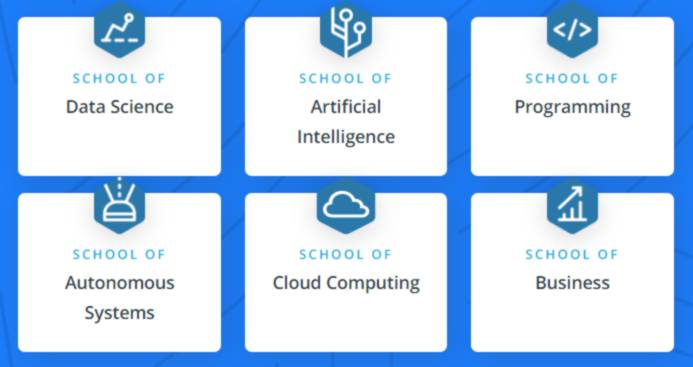| Professional Credentials To Further Your Career |
| Written by Sue Gee | |||
| Saturday, 02 September 2023 | |||
Page 1 of 2 Software Development is still a career where you can thrive without professional certificates. On the other hand employers looking to promote from within their existing talent increasing take notice of online credentials. And expanding your skill set can be personally fulfilling as well as financially advantageous. Disclosure: When you make a purchase having followed a link to a course provider from this article, we may earn an affiliate commission.
Credentials such as Nanodegrees and Professional Certificates becoming widely recognized by employers and recruiters and so are a worthwhile investment of time and effort if you are looking to find a great job as a developer .There are plenty of options on offer and over the years we have presented details of many of them. In this article we'll look at the professional certifications awarded by Udacity, edX and Coursera - the companies we used to think of as "MOOC providers" in the days when we took advantage of a slew of high quality courses, both in terms of the instructors and the enthusiasm of the participants, that were massive, online and free. The take up of MOOCs from these fledgling organizations was huge - but there was also a high drop out rate. This shouldn't have been taken as some sort of failure on the part of the instructors. A lot of it could be explained by greedy students tasting all the options on offer and finding themselves either over-committed or our of their depth. Most of the drop out came right at the start and, as I pointed out back in 2014 this seemed perfectly reasonable: As consumers the fact that as the courses are free there is little penalty for dropping out. We can enrol, take a look at what is on offer and walk away if it we decide not to stay the course. There will be many reasons for dropping a MOOC - too easy, too difficult, too time-consuming or just because it's a mismatch with our requirements ... and given that an alternative might come along in a few months why not wait for something better. The move to charging for online courses was gradual and was made more palatable by offering us more than just the course content - and indeed there is still plenty of free course content on offer if you don't want a certificate at the end of it. But do bear in mind that while the "audit" route, available from both Coursera and edX, does give you access to the course content, you miss out on the full course experience and in particular any graded assignments. This article, however, is about the type of Professional credentials that are on offer from Udacity, edX and Coursera that are career-oriented. This distinguishes them from the more academic -oriented options covered in a previous article Gain A Computer Science Credential In 2020, when we looked at programs leading to a Bachelor's or a Master's Degree. As in that article, however, we're not confining ourselves to "just" computer science - data science, machine learning, artificial intelligence, robotics cloud computing and IoT (Internet of Things) are among the topics we have to choose between.
What's a Udacity Nanodegree? Nanodegree is a term coined by Udacity and applied to programs in which you "learn by doing". The emphasis is on hands-on projects based on real-world scenarios that are open-ended and require critical thinking. Other features that distinguish Udacity from other online training providers are:
For many computer science students it is the personalized code reviews that will be the most valuable support and in many ways how good a learning experience you get with Udacity does depend on whether your career plan is amenable to the advice and coaching on offer. While Udacity doesn't guarantees that its graduates will land a job some of its partners do recruit preferentially graduates of the Nanodegree programs they are involved with. In addition, students who enroll in any Nanodegree Program will have access to Udacity's Career Services, which include LinkedIn Review and GitHub Review.
The pricing model for Nanodegree programs at Udacity is a monthly subscription-based model. The cost varies depending on the specific Nanodegree program you choose ranges from $399 to $799 per month. Nanodegree programs are designed to be flexible, allowing you to learn at your own pace and fit your studies into your schedule so the actual duration of a program can be shorter or longer depending on factors such as the time you can dedicate to studying each week and your prior knowledge and experience in the subject area, but according to Udacity, on average, successful students complete a Nanodegree program in about 3-6 months. Since the Nanodegree was introduced in 2014 its programs have focussed on gaining the skills required for a career. Its first offerings, which having been updated and expanded are still available, were Front-End Web Developer, Back-End Web Developers, and Mobile iOS Developer, there are now nearly 70 Nanodegrees all at the cutting edge of technology. The Program catalog is organized into Udacity's eight Schools - the original six above plus the School of Cybersecurity and the School of Product Managment. And while you might think the School of Business has nothing to offer, it includes beginner level courses that you may well find relevant such as UX Designer, Marketing Analytics, Predictive Analytics for Business. SQL is also listed there as well as in the School of Data Science and, if it isn't a skill you already have the fact that it came top, for the second year running, in the 2023 IEEE Specturm ranking of Top |Programming Languages For Jobs suggests that it might be a nanodegree program worth considering. It is a Beginner level course that lasts 2 months when you devote 10 hours per week to it. Perhaps the best way to see if you'd be interested in it is to look at its projects. The first, which has 7 accompanying lessons, is titled Deforestation Exploration in which learners will act as a data analyst for an organization on a mission to reduce deforestation around the world and to raise awareness about this important environmental topic. This involves cleaning erroneous values in a table, join that table to another lookup table to bring in a new categorical and quantitative variable, and return a new view of all categories greater than a reference value. Having created and executed SQL queries learners will compile their answers and summarize their analysis into a report that can be shared to a leadership team. The second project, with 6 lessons, is Uddidit, A Social News Aggregator in which learners investigate the provided data model for potential errors such as lack of normalization, consistency rules, and proper indexing, then, create a new, normalized database using DDL based on the denormalized one provided and finally write DML queries to migrate the data from the denormalized schema to their normalized schema. Over the years we have covered the majority of Udacity's Nanodegree programs (see the long list of Related articles) but bear in mind their content is revised and updated to keep abreast of latest changes in the technology. I Programmer team member Nikos Vaggalis has had first hand experience of three Nanodegree programs - the original Android Developer program, the Java Web Developer Nanodgree and Cloud Native Application Architecture Nanodegree and shared his learning in his reports which you can find here. He considers completing a Nanodegree to be a real achievement. It requires commitment, stamina and a great deal of work but it is a rewarding thing to do and well worth it at the end of the day.
|
|||
| Last Updated ( Tuesday, 12 September 2023 ) |


